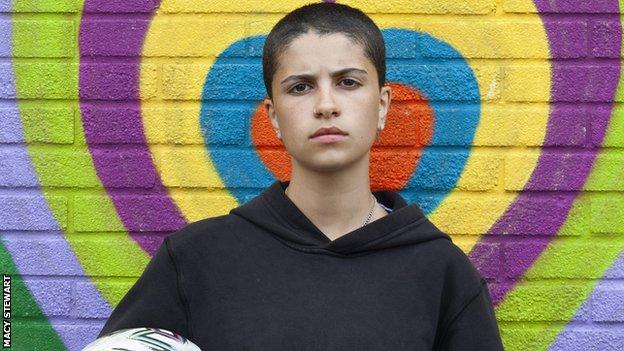'Where you really from?' - Race and identity in Northern Irish football
- Published

Former NI youth international Zubier has played for Cliftonville and Crusaders
Rosie Zubier represented Northern Ireland in football at youth level for more than six years. Not once did she feel like part of the team.
It was a sense of alienation that had nothing to do with poor relations with her team-mates. In fact comradery was - as it so often is in sport - the antidote.
Far more often than not Zubier was the only mixed race player in her team. It was not something ever discussed in depth with her fellow players, not through avoidance but more a shared desire to spend their time discussing tactics or indeed any form of "complete nonsense" that tends to dominate changing rooms.
But on the pitch when representing a country of which, per the 2011 census, 98.2% of the population is white, Zubier became the subject of scrutiny.
"Whenever we were in Florida a couple of other teams couldn't believe I was Northern Irish, they thought I was wearing the wrong kit," recalls the 18-year-old.
"It happened whenever I was playing in Euro qualifiers in Slovenia and in Edinburgh where people were like 'there's absolutely no way you're Northern Irish'."
Born in Belfast to a Northern Irish mother and a Sudanese father who moved to the west of the city as a child, everyday life in an overwhelmingly white part of the world has seen Zubier's national identity called into question on an almost daily basis.
At its best sport is seen to offer a safe haven from the difficult realities of life; a characteristic cherished by sport lovers across the world - but for Zubier it was simply not the case. Representing Northern Ireland on an international stage, her race was only placed further into the spotlight.
"It makes you feel as though you don't really belong anywhere almost," she says.
"I think if I went to Sudan people would go 'oh you're not from here' but then I get people saying it to me here as well."
"I don't know where I fit in, and I don't know what I'm supposed to do here. I don't know who my people are."
'People find a way of excusing it through emotion'
Zubier is a subject of short film 'Where You Really From?' which charts the experiences of three non-white footballers growing up in Northern Ireland.
The film explores the idea that while football, or sport, can provide a shared experience that transcends difference and division, it can also be part of the problem. That the magnified emotions experienced in both watching and playing sport can falsely present people with an opportunity to say whatever they want and put it down to the heat of the moment.
"I think because football is so heavily based on emotion, often people get caught up in the moment and say things that they would absolutely never say in a normal setting," says Zubier.
"Because it's so emotional everyone's like 'oh I suppose they just said it in the heat of the moment, we can forgive them'.
"People of colour get it the worst because there is something that is inherently different about them and that's the thing that is preyed on. Often people of colour in football teams are the minority group, meaning they're the people that stand out the most.
"I have found that if a white person was to make a mistake on the pitch and then a black person was to make the same mistake, the black person would get a hell of a lot more stick.
"I think they can somehow justify it, but people find a way of excusing it."
'People are making more effort to educate themselves'
There is work to be done. As society finds ways to confront racism so too must sport - but who should be leading the charge?
Zubier believes that an important first step is acknowledging that the onus is not on youth players, particularly ethnic minorities, to open avenues of conversation and change.
The motivation for change needs to come from the decision makers within the sports and the clubs. It is something that, if slowly, Zubier believes is happening in the wake of the Black Lives Matter movement and the protests that followed the murder of George Floyd.
"The vast majority of people I know and would be around definitely have made much more of an effort to educate themselves on other people's ethnic backgrounds and cultures," she says.
"I think it's actually quite amazing to see.
"It has been the first time in my life where other people have chosen to spend their own time trying to educate themselves about where I'm from and where my family are from."